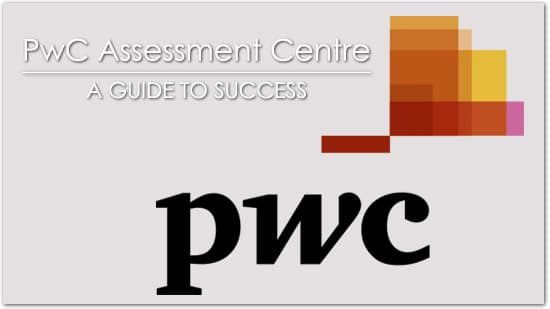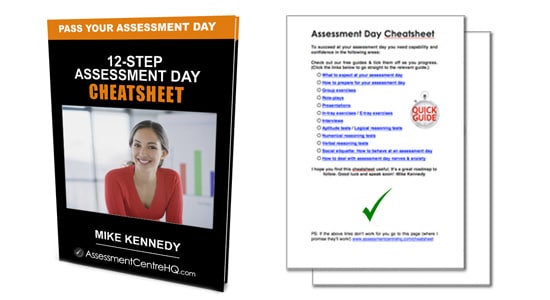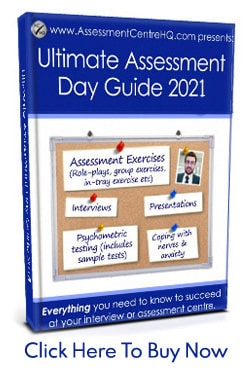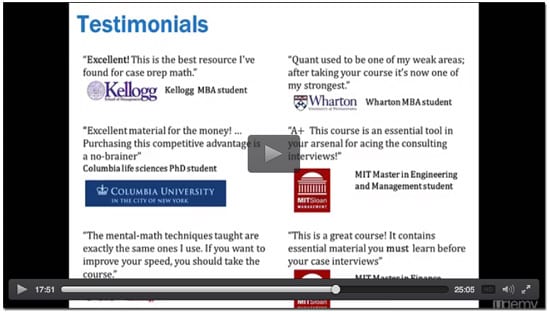PwC Assessment Centre: 2023 Success Guide

Table of Contents
PwC Assessment Centre Success Guide
This guide will tell you what to expect and how to succeed in the PwC recruitment process, which is known to be very difficult to pass.
An important point before we begin
- Note that different employers use different test suppliers. PwC uses SHL tests. You can practice them here.
Download our Ultimate Assessment Day & Interview Guide 2022 here. (It's packed with tips, tricks and insider-secrets to help you succeed.)
PwC Assessment Centre Success Guide
The PwC Assessment Centre is one of the most competitive assessment events in the UK, particularly for graduates. Before you attend, it is vital that you understand what is required to succeed.
As such, this guide will cover each of the 6 assessment criteria used by the PwC tests to assess candidates.
PwC Assessment Centre Criterion 1: Business and Client Service
At the PwC Assessment Centre, it is very important that you can demonstrate you have an interest in what they do. As such, you need to show a level of business knowledge about the company. This includes their clients and the market they operate in. So, make sure you dedicate some time to researching the PwC.
Action point: Download PwC’s annual report and spend an afternoon digesting it and making notes on the key points. (You can find it here.) Reference your findings in your interview. It will mark you out as someone with an eye for detail and good commercial acumen.
(Do enough research before the PwC tests to assess know your potential employer’s business and financial position. As a minimum, you should understand what their turnover is, how much of that is net profit and how much debt the business carries. What are the key challenges they currently face in their marketplace? What are their aims during the next 5 years?)
PwC emphasized the importance of client focus. So, it is important that you can show that you have an understanding of PwC’s key clients’ business needss.
Action point: Read some PwC case studies and think of 2-3 ways you could actively improve their top 5 clients’ businesses and you will put a big tick in this box.

PwC Assessment Centre Criterion 2: Working in Teams
In the PwC assessment test, you must be able to highlight specific examples of how you have worked with others toward a shared goal. It will help you to answer the following:
- How adaptable is your approach?
- Can you negotiate?
- Can you influence?
- Are you sensitive to others’ work styles and can you be flexible?
- How can you prove that you are respectful of other people’s backgrounds, cultures, and beliefs?
Action point: Make a list of 5 solid examples that you can reference during the PwC assessment test (throughout the day) and you will wow your assessors.
PwC Assessment Centre Criterion 3: Communicating with Impact and Empathy
At the PwC assessment test, like any other assessment centre, you must demonstrate you can communicate in a fluent and effective way. This can be hard on the day itself because you are likely nervous.
Action point: Prepare 3 examples of how your communication skills directly led to a successful outcome of some kind. (Hint: try and prepare an example for each of the following: your colleagues, your manager and a client.)
For tips on keeping your nerves under control at your PwC assessment test, read our article “How To Deal With Nerves & Anxiety At Your Assessment Centre“.

PwC Assessment Centre Criterion 4: Manage Projects & Economics
During your PwC assessment test, you will be asked to provide examples that show you can plan and perform work according to strict deadlines and success criteria.
What tasks and projects can you highlight at your PwC assessment test that show you can work to inflexible timings and flourish under pressure?
Action point: Prepare 2 examples – one of which must demonstrate you have the ability to ‘think on your feet’.
(Did the goalposts move for this project? Did the deadline get brought forward? Did the client/stakeholder alter their requirements while the project was in motion? What did you do -that was awesome- that saved the day?)
This is an absolutely key criterion that carries a lot of weight in the PwC assessment test. Take the time to prepare in this area.
HINT: Make circular references back to your CV and tie in your examples to present powerful and cogent examples. (The Telegraph has a good section you can plunder for CV tips.)
PwC Assessment Centre Criterion 5: Be Open-minded, Agile with Change and Practical
One of the interview techniques that is commonly used in the PwC assessment test is what we refer to as ‘the rug pull’: throwing a candidate off step by introducing something new or unexpected, to see how they react to change and how good they are at thinking on their feet.
So, you need to be able to move from one topic to the next and display seamless focus.
Action point: Practise talking in detail about career highlights or your aims for the future. Move from one to the other every 30 seconds or so.
Switching gears can be tough, but you will notice after 5-10 minutes or so how much easier it becomes to take that stream of consciousness forward with enthusiasm and without missing a beat.
Action point 2: Prepare 2 examples for your PwC assessment test of how you dealt with change in a professional or academic setting. How did you maintain your effectiveness throughout the transition?
.
Stop worrying! Download a 12-step assessment day cheatsheet & be perfectly prepared.
Click here to download your copy

.
PwC Assessment Centre Criterion 6: Personal Development
Many people can and do impress on the PwC assessment test, but the one trait that separates strong candidates from elite candidates is a focus on self-improvement.
Read this article “The Real Secret To Career Success” for more information.
The personal development criteria may seem trivial and simple for an actual test like this, but you should take it seriously. This is an important part of the PwC application process, so prepare for it like how you would prepare for other parts of the test.
Action point: Think of ways on how you can demonstrate a commitment to your personal development and the future.
Action point 2: Check out Stephen Covey’s business classic “The Seven Habits of Highly Effective People“. It’s a bible for success in your career and personal life. Referencing this at your PwC assessment test will make a big impression on the assessors.
Action point 3: You can also ask question during your PwC interview. For example, you can ask about how PwC can help you grow. Are their training and development opportunities if you get accepted?
Practise PwC’s Assessment Exercises & Tests
Nothing will improve your performance more than familiarity with the tests and exercises that PwC uses. Practising beforehand will improve your competence and also help you feel more relaxed, which will further boost your performance level.
You can practise the tests that PwC uses here. (These tests aren’t free, but they are a must-buy for candidates who want to do everything possible to ensure they succeed in PwC’s notoriously difficult recruitment process.)
Important: PwC Use “Cut-e” Style Tests
As you may have read elsewhere on the site, different employers use different test suppliers to assess candidates. The difference between tests can be small or big, as there are various test publishers in the market.
If you want to be part of the Audit and Tax graduate programmes of the PwC, you will need to take cut-e tests. You find practice tests in the following: cut-e verbal tests and cut-e numerical tests.
PwC Assessment Centre – A Useful Video from PwC
FastMaths – Case Study Interview Preparation
This course from Matthew Tambiah gets straight to the point. It teaches fast techniques to help candidates quickly solve the commercial problems posed in management consulting interviews and case studies. If you are seeking a job with companies like KPMG, PwC, or Deloitte, this one is for you.
The course has two components.
1) The first half of the course teaches techniques to answer numerical reasoning tests and perform calculations quickly and efficiently without using a calculator or spreadsheet (as required in case interviews).
2) The second half of the course reviews the most common types of quantitative problems given in case study interviews. The course shows students the most efficient solution method for each problem type and how to use the computational techniques taught in the first portion of the course to generate answers quickly and efficiently.
The course highlights how to use the results of the quantitative analysis to generate insights and recommendations relevant to the overall case.
All the example problems used in the course are derived from real case studies from leading management consulting firms including Deloitte, McKinsey, BCG, and Accenture.
Some final questions for you…
- Do you have to take a numerical reasoning test or a verbal reasoning test? If so you may want to check out the aptitude tests section of the site.
- You can find practice tests and tons of free advice on every other type of ‘reasoning test’ too: numerical, verbal, abstract, logical, inductive, diagrammatic, spatial, mechanical comprehension, UKCAT and Watson-Glaser tests.
- Worried about your assessment day? Maybe you’re worried about performing a presentation or preparing for an interview or group exercise or in-tray exercise?
- Perhaps you’d like some guidance on how to deal with nerves & anxiety at your PwC assessment test?
- Lastly the Tools and Resources page is packed with useful equipment and ‘A’ List recommendations that will make your life easier.
Final Words
Hopefully, this PwC assessment test preparation guide will provide you with ample test preparation materials to pass the recruitment process and achieve your dream career.
On your assessment day, remember to stay calm. Just keep in mind that you have done all you can to prepare. Focus on answering questions properly and hope that all your hard work pays off.
Turbocharge your employability NOW
Get your copy of our Ultimate Assessment Day & Interview Guide here. It's packed with tips, tricks and insider-secrets to help you succeed.
.
© Copyright AssessmentCentreHQ - All Rights Reserved
.
FAQs
1. Are PwC assessments hard?
PwC test assessments can be hard, but they are also very rewarding. The assessments are designed to test your skills and knowledge, which you can improve with proper preparation.
2. How long is the PwC Assessment?
The PwC online assessment, which includes aptitude tests and a video interview, takes about two hours to complete. The PwC final assessment will be yours if you succeed in this phase of the assessment process and are invited.
3. How do I pass the PwC Test?
There is no one-size-fits-all answer to this question, as the best way to pass the PwC assessment test may vary depending on your individual strengths and weaknesses. However, there are some ways to improve your chances: study hard for the tests, practise answering interview questions, and dress smartly.
4. What can I expect at the PwC Assessment Centre?
The PwC assessment test is a full day of activities that will test your skills and abilities. You can expect to complete a number of exercises, including case studies, interviews, and group activities. Be prepared to be evaluated on your problem-solving skills, teamwork abilities, and communication skills.
5. How long does PwC take to get back to you?
It can take a few weeks for PwC to get back to you. They will likely let you know whether you have been successful or not at the end of the process. Be patient and wait for the results.
Sarah is an accomplished educator, researcher and author in the field of testing and assessment. She has worked with various educational institutions and organisations to develop innovative evaluation methods and enhance student learning. Sarah has published numerous articles and books on assessment and learning. Her passion for promoting equity and fairness in the education system fuels her commitment to sharing insights and best practices with educators and policymakers around the world.








